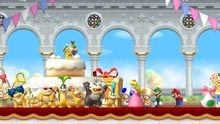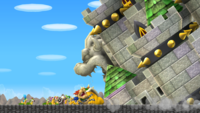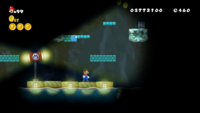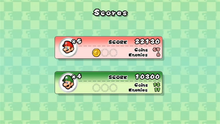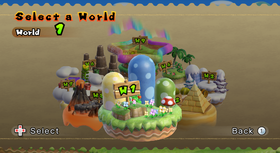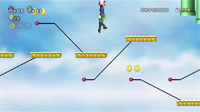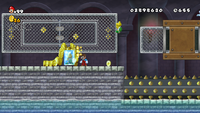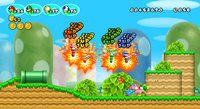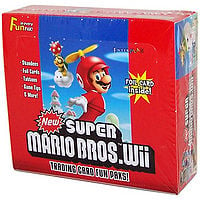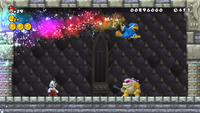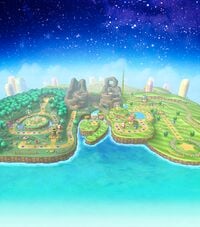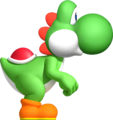New Super Mario Bros. Wii
- "NSMBW" redirects here. For the game sometimes abbreviated as "SMBW", see Super Mario Bros. Wonder.
- Not to be confused with New Super Mario Bros. Mii.
| New Super Mario Bros. Wii | |||||||||||||||||
|---|---|---|---|---|---|---|---|---|---|---|---|---|---|---|---|---|---|
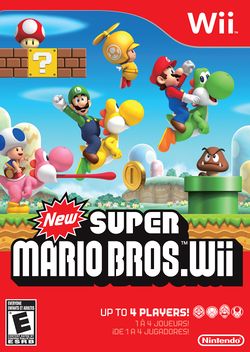 American box art For alternate box art, see the game's gallery. | |||||||||||||||||
| Developer | Nintendo EAD | ||||||||||||||||
| Publisher | Nintendo | ||||||||||||||||
| Platform(s) | Wii, Wii U, Nvidia Shield TV (Mainland China only)[1] | ||||||||||||||||
| Release date | Wii (original release): Wii (Nintendo Selects): Wii U (digital download): Nvidia Shield TV: | ||||||||||||||||
| Language(s) | English (United Kingdom) English (United States) French (France) French (Canada) German Spanish (Spain) Spanish (Latin America) Italian Japanese Simplified Chinese1 Traditional Chinese Korean 1 - Only in the Nvidia Shield TV version. | ||||||||||||||||
| Genre | Platformer | ||||||||||||||||
| Rating(s) |
| ||||||||||||||||
| Mode(s) | Single player, cooperative and competitive multiplayer (up to four players) | ||||||||||||||||
| Format | Wii: Wii U: | ||||||||||||||||
| Input | Wii: Nvidia Shield TV:
| ||||||||||||||||
| Serial code(s) | |||||||||||||||||
New Super Mario Bros. Wii is a side-scrolling 2.5D Super Mario game for the Wii and the twelfth game in the Super Mario series.[5][6] The game was released in Oceania on November 12, in North America on November 15, in Europe on November 20, and in Japan on December 3, 2009; it is the first main series game to be released first in the Oceanian regions, and the first and currently the only Super Mario platformer that was not released in Japan or America first. It is a follow-up to the 2006 Nintendo DS game New Super Mario Bros.
In addition to the single-player experience, New Super Mario Bros. Wii also features a multiplayer mode for up to four players. This is the first side-scrolling Super Mario game to feature co-op and vs. modes at the same time, and the first one overall since Mario Bros. It features more items and more enemies than its DS predecessor. It is also the first title to support Nintendo's new Super Guide mode.[7] The game introduces two new power-ups, the Propeller Mushroom and the Penguin Suit, which turn characters into their propeller and penguin forms, respectively.
New Super Mario Bros. Wii is the first 2D platformer Super Mario title to hit a home console since Super Mario World for the SNES (released 19 years prior). To date, the game has sold over 30 million copies worldwide, making it the fourth best-selling Wii game overall and the second best-selling Super Mario game on the system, after Mario Kart Wii.[8] New Super Mario Bros. Wii received two follow-ups in 2012: New Super Mario Bros. 2, a direct sequel to New Super Mario Bros. for the Nintendo 3DS, and New Super Mario Bros. U, a direct sequel to this game as a launch title for the Wii U.
This is the first of two games released outside of Japan and South Korea to feature a different-colored game box, the second being the Wii version of Mario & Sonic at the London 2012 Olympic Games. The box for New Super Mario Bros. Wii is red, as opposed to most other Wii games with a white box.
Story
Mario, Luigi, Yellow Toad, and Blue Toad are celebrating Princess Peach's birthday, when a big cake slides in. As Princess Peach approaches it, Bowser Jr. (who masterminded the plot to infiltrate via the birthday cake[9]) and the Koopalings jump out. The Koopalings throw the cake on top of Princess Peach, the Mario Bros., and the Toads, trapping Princess Peach inside and leaving the Mario Bros. and Toads briefly stunned. From there, the Koopalings and Bowser Jr. run out of the castle and load the cake onto their airship while the Mario Bros. and the Toads recover and follow closely. The Toads from the castle soon use a cannon to blast away presents containing Propeller Mushrooms and Penguin Suits so Mario and the others can obtain them, but they explode in the air and spread the items in 9 worlds.[10]
Throughout the chase, Mario and co. battle the Koopalings in their fortresses, then in their castles. Afterward, Bowser Jr. flies in the airship with Princess Peach stuck in it, though during two occasions, the airship leaves without Bowser Jr., allowing the Mario Bros. and Toads to chase after him. When the gang defeats Bowser Jr. in World 8, Magikoopa appears and takes Princess Peach away, taking her to Bowser's Castle and locking her in a cage.
When Mario and the gang finally get to Bowser's Castle, they find Bowser and battle him. One of them has to jump on a ! Switch behind Bowser to send him falling into the pit below. After Mario, Luigi, Yellow Toad, and Blue Toad celebrate their "victory", they see "Princess Peach" in a cage, until they realize that it is actually Magikoopa in disguise. Magikoopa then sprinkles magic into the pit Bowser fell in, which turns Bowser giant. After Bowser has been powered up, the four can do nothing but flee from the giant boss. Soon they find a dead end with a huge ! Switch, and the real Princess Peach in a cage above it. They push it, and Bowser falls through the floor as the princess is released from her cage. As Mario and Princess Peach walk out, they see Luigi, Yellow Toad, and Blue Toad arrive in their hot air balloons. Luigi lets Mario and Princess Peach into his balloon but is accidentally left behind, so Yellow Toad and Blue Toad offer Luigi a ride in their balloon. As they sail off, Princess Peach asks Mario if she told him about the secret world. If the player beats the level again, Princess Peach will ask Mario to tell her about his adventure again.
In a post-credits scene, Larry Koopa arrives at Bowser's Castle from World 1 and is shown exhausted and limping before collapsing onto the ground. Bowser Jr. walks up to him and orders him to get up and help the rest of the Koopalings trying to push Bowser, who is now back to normal size, right side up. They finally succeed and celebrate, but the castle soon falls on top of Bowser before the screen cuts to black and a crushing sound is heard, along with Bowser groaning in pain.
Gameplay
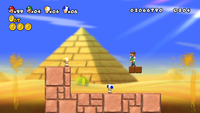
The gameplay of the game is mostly based on its DS predecessor. The story mode of the game can be played in either single-player mode or multiplayer cooperative mode. Players can be freely added and removed in between levels on the world map. The camera pans as players move, and it zooms in and out depending on their distance to one another. However, there is a limit, and players who are far behind lose a life.
After players clear World 1-3 for the first time, a Toad runs up and tells the heroes that Bowser Jr. ordered his minions to stuff Toads they capture into ? Blocks. If the level was cleared in single-player mode, a Goomba then appears and carries the Toad to a ? Block in World 1-1, where the player must carry him to the goal. Toads can be rescued only in single-player mode.
When a player loses a life in multiplayer, they reappear inside a bubble. The player inside the bubble can shake the Wii Remote to bring themselves closer to the other players that are currently not in a bubble. Bubbles can burst only when a player not in a bubble comes in contact with the bubble or throws a fireball, ice ball, shell, or frozen enemy at the bubble. A player can place themselves in a bubble purposefully without losing a life by pressing the ![]() button on the Wii Remote or the
button on the Wii Remote or the ![]() button on the Nunchuk if it is connected. The player inside the bubble cannot be harmed by anything and retains their previous form. However, if everyone has lost all their lives, or if someone loses a life and everyone else is in a bubble, then all players have to restart the level from the beginning or the midway point if the players touched it on a prior attempt. The players in bubbles return to their normal forms but do not lose any lives.
button on the Nunchuk if it is connected. The player inside the bubble cannot be harmed by anything and retains their previous form. However, if everyone has lost all their lives, or if someone loses a life and everyone else is in a bubble, then all players have to restart the level from the beginning or the midway point if the players touched it on a prior attempt. The players in bubbles return to their normal forms but do not lose any lives.
When one player grabs the pole at the end of the level, the timer stops and the other players would have three seconds to grab the pole before the level ends. If they do not make it in time, the level still ends; however, there is no penalty to the players left behind other than the lost opportunity for points or a 1-Up by grabbing the pole.
Players play the game by holding the Wii Remote sideways or by using the Wii Remote and Nunchuk combination. If a player tilts the Wii Remote, certain actions can be performed, such as changing the direction of a light or tilting special platforms when they have been activated. Players can activate these by standing on them; the color and the symbol of the character on the platform determine who is controlling them.
Shaking the Wii Remote activates the Spin Jump, as seen in Super Mario World. Players can carry objects such as frozen enemies and barrels by ![]() (
(![]() with the Nunchuk) and shaking the Wii Remote near the object.
with the Nunchuk) and shaking the Wii Remote near the object.
It is possible to ride on Yoshi as well. In addition to his usual ability to consume most enemies, he can retain many different objects in the game in his mouth, including hammers, fireballs, ice balls, shells, Toads, power-ups, and other players. Yoshi can also use his Flutter Jump, a move first introduced in Super Mario World 2: Yoshi's Island. Similar to in Super Mario World, Yoshi can eat five apples in a course to produce an egg with a power-up or 1-Up. Yoshi cannot be harmed by sharp objects and enemies such as Spinies and Piranha Plants as long as he lands on them. Yoshi(s) brought to the end of the course must be abandoned, and therefore there are only certain levels in which players can ride Yoshis.
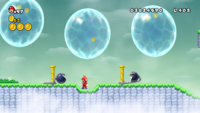
Enemy Courses return from Super Mario Bros. 3, as well as Toad Houses; items obtained are stored in an inventory that can be accessed with the ![]() button (
button (![]() button with the Nunchuk) on the map screen. Unlike in New Super Mario Bros. and Super Mario World, there is no spare item box, so players cannot activate items during levels. Pressing
button with the Nunchuk) on the map screen. Unlike in New Super Mario Bros. and Super Mario World, there is no spare item box, so players cannot activate items during levels. Pressing ![]() on the map allows the player to go to any previously visited world.
on the map allows the player to go to any previously visited world.
Up to five stars can appear on a player's profile. The first appears after the player has beaten Bowser for the first time (using any method), the second appears when all levels in the first eight worlds (except Warp Cannons/Pipes and Toad Houses) have been beaten, the third appears if all Star Coins from Worlds 1 to 8 are obtained, the fourth appears when all Star Coins in World 9 have been obtained, and the fifth appears once the player has beaten every level (including Warp Cannons, etc.) and has collected every Star Coin. The stars shine if the Super Guide block did not appear at all during the game, even if it is not used when it appears.
Super Guide
- Main article: Super Guide
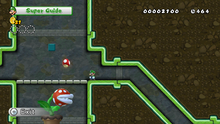
Debuting in this game, the Super Guide provides players assistance to clear levels. When the player has failed to pass a level at least eight times in single player, a green box appears at the start of the level or at the midway point. When the player hits the green box, the level restarts in autopilot mode: A computer-controlled Luigi plays the level on his own. The Super Guide only shows the player how to beat the level, but it does not use shortcuts, nor reveals secrets. While the Super Guide is running, the player can press the ![]() button on the Wii Remote at any time to take control back; the game starts exactly where the Super Guide left off. Once the player has taken control back, they cannot turn it back on during the remainder of the level. Even when the Super Guide assistance is used, the level is still considered complete, though it is now marked red, and the stars on the save file no longer shine. If the player takes over, they continue to play as Luigi rather than Mario. Losing a life as Luigi allows the player to control Mario again, without losing a life.
button on the Wii Remote at any time to take control back; the game starts exactly where the Super Guide left off. Once the player has taken control back, they cannot turn it back on during the remainder of the level. Even when the Super Guide assistance is used, the level is still considered complete, though it is now marked red, and the stars on the save file no longer shine. If the player takes over, they continue to play as Luigi rather than Mario. Losing a life as Luigi allows the player to control Mario again, without losing a life.
Free-for-all
Free-for-all is a multiplayer-only mode that is selectable from the game's main menu. Every course from the main game is selectable in this mode, although the worlds have to be beaten once in the main game in order to play them in Free-for-all. This mode is very similar to the main game, but there are no midway points, and on the end of a level, the number of points each character got is seen. However, unlike in Coin Battle, the character does not say a "happy" phrase after winning, and the number of times each player won is also not seen. Additionally, if all of the players manage to get to the pole, the level is marked on the level-selection menu with a gold frame, and the words "TEAM FINISH!" is seen for about a second. If not all players manage to reach the pole, it is marked with a silver frame and the word "CLEAR!" is seen instead.
- Names in other languages
| Language | Name | Meaning | Notes |
|---|---|---|---|
| French (NOA) | Pagaille[?] | Mayhem | |
| French (NOE) | Mode libre[?] | Free mode | |
| German | Freier Modus[?] | Free Mode | |
| Italian | Modalità libera[?] | Free Mode | |
| Spanish (NOA) | Modo Conquista[?] | Conquest Mode | |
| Spanish (NOE) | Modo Libre[?] | Free Mode |
Minigames
Controls
When playing on a Wii or Wii U, the game requires a Wii Remote by itself horizontally or attached to the Nunchuk. The controller for the Nvidia Shield TV has a more conventional layout and lacks the same motion-sensing capabilities of the Wii Remote. To compensate, actions that originally involved shaking the Wii Remote are performed by pressing the trigger or bumper buttons.
| Action(s) | Input(s) | |||
|---|---|---|---|---|
| Horizontal Wii Remote | Wii Remote + Nunchuk | Nvidia Shield controller | ||
| Course controls | ||||
| Move, swim in Penguin form, enter door, crouch, enter pipe | ||||
| Spin Jump, fly in Propeller form | Shake |
Shake |
||
| Jump, swim | ||||
| Dash, carry item, toss fireball, toss ice ball | ||||
| Triple jump | (repeat twice) |
(repeat twice) |
(repeat twice) | |
| Wall jump | ||||
| Ground pound | ||||
| Pick up players and items | Hold |
Hold |
Hold | |
| Enter bubble in multiplayer | ||||
| Tilt platforms | Tilt |
Tilt |
||
| World Map controls | ||||
| Navigate | ||||
| Confirm command, select course | ||||
| Cancel command, activate item menu | ||||
| Look around on map screen | ||||
| Display HOME menu | ||||
| Display pause menu | ||||
| Open World Select | ||||
Locations
Overview
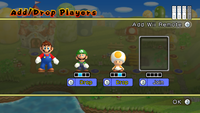
The game has nine worlds with a world map similar to the one in New Super Mario Bros. There still are Toad Houses, towers, castles, Warp Cannons, Warp Pipes (in World 2 and World 6), vines (in World 7), and horizontal "platform" Pipes (in World 6). Enemies also patrol the map screen. If the enemies come in contact with players, they must play an Enemy Course. Players must collect eight Toad balloons to make a chest with a Toad trapped in it appear. If the Toad is saved, the players are rewarded with three Super Mushrooms. Each Enemy Course is different in each world. The layout of the worlds (either horizontally or vertically) alternates among the worlds, with the odd-numbered worlds, Worlds 1, 3, 5, and 7, all going in a horizontal left-to-right direction, and the even-numbered worlds, Worlds 2, 4, 6, and 8, all going in a vertical down-to-up direction.
There are 77 courses in the main game, 14 of which have secret exits, bringing the total number of exits to 91. Captured Toads are sometimes hidden in previously beaten levels in single-player mode. If the Toad is carried to the level exit without being damaged, Mario is rewarded with three 1-Ups. However, only one 1-Up is rewarded to Mario if the Toad took damage before reaching the goal. Additionally, when Toad is saved, the "Course Clear" theme from Super Mario Bros. is played instead of the normal one, fireworks go off, and a Toad House opens at the starting point of the world. The type of house that appears depends on the last digit in the level timer when Toad and/or Mario touch(es) the pole. If the Toad is damaged twice, it is defeated, and Mario cannot bring it to the goal anymore.
Captured Toads appear only in the following levels:
Other than the game's main campaign, which can be played with up to four players, New Super Mario Bros. Wii offers special multiplayer challenges. Those challenges have some levels taken from the campaign and some newly created levels. There is a Free for All mode and a Coin Battle mode. The Free for All mode has players competing for a high score, while the Coin Battle mode has them competing for the most collected coins in the level.
World 9 is unlocked after completing the game. There are eight stages in that world, and each stage is unlocked by collecting all the Star Coins in each of the preceding eight worlds.
Table
| Worlds | ||
|---|---|---|
| World 1 |
Levels | |
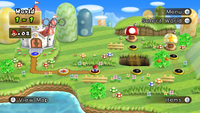
|
World 1- |
World 1-1 |
| World 1-2 | World 1-3 | |
| World 1- |
World 1- | |
| World 1-4 | World 1-5 | |
| World 1-6 | World 1- | |
| Grassy fields near Peach Castle dotted with spotted hills. The boss in this world is Larry Koopa and the Enemy Courses have Goombas. The Warp Cannon blasts the player to World 5. The player can visit Peach Castle and spend Star Coins to watch hint movies. Unlock criterion: start a new game | ||
| World 2 |
Levels | |
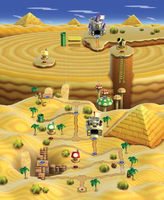
|
World 2-1 | World 2-2 |
| World 2-3 | World 2- | |
| World 2-4 | World 2-5 | |
| World 2-6 | World 2- | |
| World 2- | ||
| A desert with cactuses and palm trees. The boss in this world is Roy Koopa and the Enemy Courses have Spinies. Like World 1, the cannon blasts the player to World 5. Unlock criterion: complete World 1- | ||
| World 3 |
Levels | |

|
World 3-1 | World 3-2 |
| World 3-3 | World 3- | |
| World 3- |
World 3- | |
| World 3-4 | World 3-5 | |
| World 3- | ||
| A snow-covered coniferous forest with icy platforms and penguin enemies. The boss in this world is Lemmy Koopa and the Enemy Courses have Ice Bros. Ghost Houses are introduced here. The Warp Cannon blasts the player to World 6. Unlock criterion: complete World 2- | ||
| World 4 |
Levels | |
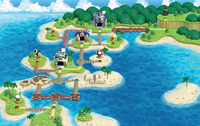
|
World 4-1 | World 4-2 |
| World 4-3 | World 4- | |
| World 4- |
World 4-4 | |
| World 4- |
World 4-5 | |
| World 4- |
World 4- | |
| An archipelago of small tropical islands connected by bridges. The boss of this world is Wendy O. Koopa and the Enemy Courses have Porcupuffers. Bowser Jr. is fought on an Airship for the first time. Like World 3, the Warp Cannon blasts the player to World 6. Unlock criterion: complete World 3- | ||
| World 5 |
Levels | |
| World 5-1 | World 5-2 | |
| World 5-3 | World 5- | |
| World 5-4 | World 5- | |
| World 5- |
World 5-5 | |
| World 5- | ||
| A rainforest of poison swamps and giant insects. The boss in this world is Iggy Koopa and the Enemy Courses have Stalking Piranha Plants. The Warp Cannon blasts the player to World 8. Unlock criterion: complete World 4- | ||
| World 6 |
Levels | |
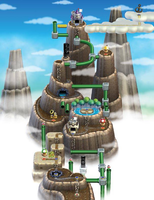
|
World 6-1 | World 6-2 |
| World 6-3 | World 6-4 | |
| World 6- |
World 6-5 | |
| World 6-6 | World 6- | |
| World 6- |
World 6- | |
| A range of rocky mountains, with each level going farther along the range. The boss in this world is Morton Koopa Jr. and the Enemy Courses have Bullet Bills. Bowser Jr. is refought here at the end of the world. The final Warp Cannon is found here and, like World 5, blasts the player to World 8. Unlock criterion: complete World 5- | ||
| World 7 |
Levels | |

|
World 7-1 | World 7-2 |
| World 7-3 | World 7- | |
| World 7- |
World 7-4 | |
| World 7-5 | World 7-6 | |
| World 7- | ||
| A sky-themed area with many mountains and high cliffs. The boss in this world is Ludwig von Koopa and the Enemy Courses have Lakitus. Unlock criterion: complete World 6- | ||
| World 8 |
Levels | |
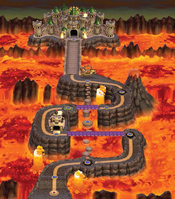
|
World 8-1 | World 8-2 |
| World 8-3 | World 8- | |
| World 8-4 | World 8-5 | |
| World 8-6 | World 8-7 | |
| World 8- |
World 8- | |
| A lava-filled basin with several volcanoes, similar to many other final worlds in the Super Mario series, most resembling Dark Land from Super Mario Bros. 3. The bosses in this world are Magikoopa in the game's final Tower level, Bowser Jr. in the final Airship, and Bowser at his castle; and the Enemy Courses have Lava Bubbles. Unlock criterion: complete World 7- | ||
| World 9 |
Levels | |
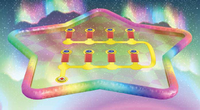
|
World 9-1 | World 9-2 |
| World 9-3 | World 9-4 | |
| World 9-5 | World 9-6 | |
| World 9-7 | World 9-8 | |
| A star-shaped area in space, with its levels having all of the themes incorporated together. Unlock criterion: complete World 8- | ||
| World Coin |
Levels | |
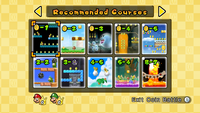
|
World |
World |
| World |
World | |
| World | ||
| A multiplayer-only world where there are only five stages (found in the Recommended Courses tab on the level-select menu) available alongside the rest of the levels in the game, with each level containing large numbers of coins for players to collect. | ||
Characters
Playable characters
| Name | Description |
|---|---|
 Mario |
Mario returns from his appearance in New Super Mario Bros. as the game's main protagonist, with his goal being to save Princess Peach from Bowser's clutches. He is the default playable character, and is the only playable character in single player mode. |
 Luigi |
Luigi, Mario's brother, also returns from his appearance in New Super Mario Bros. as a playable character in this game, however, he can played only in multiplayer and Super Guide. |
 Yellow Toad and Blue Toad |
Toads make their second playable role in the Super Mario series (the first being Toad in Super Mario Bros. 2) as two separate playable characters in this game, Yellow Toad and Blue Toad, who are exclusive to multiplayer. |
Yoshi
| Name | Description |
|---|---|
 Yoshi |
Yoshi is a dinosaur-like creature that can be ridden through several levels. In addition to his ability to consume most enemies, he can retain many different objects in the game in his mouth, including hammers, fireballs, ice balls, shells, Toads, power-ups, and other player characters. Yoshi can also use his Flutter Jump, a move first introduced in Super Mario World 2: Yoshi's Island. Similar to Super Mario World, Yoshi can eat five fruits in a course to produce an egg with a power-up or 1-Up. Yoshi cannot be harmed by sharp objects and enemies such as Spinies and Piranha Plants as long as he lands on them. Unlike Super Mario World, Yoshi cannot be brought across courses, limiting his availability. In multiplayer mode, the other playable characters gain access to to other colored Yoshis: namely Yellow Yoshi, Light Blue Yoshi, and Pink Yoshi. |
Non-playable characters
| Name | Description | Locations |
|---|---|---|
 Princess Peach |
Princess Peach is celebrating her birthday when Bowser Jr. and the Koopalings suddenly emerge from a birthday cake and kidnap her, forcing Mario and company to rescue her. | World 8- |
 Toads |
Toads help the main protagonists throughout the story mode by hosting minigames in Toad Houses for players to collect extra lives and power-ups. They can also be rescued in Enemy Courses and certain levels for the same rewards. | World 1-1, 1-2, 1-3, 1-5, 1-6, 2-1, 2-5, 3-1, 3-2, 3-3, 3-5, 4-3, 4-5, 5-2, 5-3, 5-5, 6-2, 6-4, 7-1, 7-3, 7-5, 8-1, 8-2, 8-3, 9-1, 9-3, 9-5, 9-6, 9-8, Princess Peach's Castle, Toad Houses, Enemy Courses |
Jumbo Ray |
Harmless, large green variants of mantas that fly through the air in large arcs, allowing players to stand on them as long as they remain on-screen. | World 5-5 |
Enemies and obstacles
Enemies
The enemies listed in this table match those in the Super Mario Bros. Encyclopedia[11] and Mario Portal Game Archive.[12] The default order they are listed derives from their occurrence in-game with adjustments to ensure enemies are listed next to their immediate relatives. The Mega Deep-Cheep is lumped with its smaller counterpart in both sources, but it is recognized as distinct in the original New Super Mario Bros. and this is followed suit here.
The displayed English names appear in the Prima Games guidebook,[13] the EnterPlay trading cards, and officially-licensed sources published before New Super Mario Bros. Wii. Two localization choices made are deviated from here: Sledge Bros are referred to as "Sumo Bros." in the guidebook[14] and on their trading card, but that name was previously and subsequently used for a different enemy. Mechakoopas are referred to as "Windup Koopas" in the guidebook,[15] but are recognized under their original name on their trading card and this is followed in paratexts for subsequent games. Several enemies wholly new to the franchise did not have names published at the time of the game's release and are incorporated here in retrospect. These are Hefty Goomba, Eep Cheep, Scaredy Rat, and Big Fuzzy.
| Name | Description | Levels | Pts. | New | |
|---|---|---|---|---|---|
| First | Last | ||||
 Goomba |
Common enemies that walk in a single direction, turning when they encounter an obstacle. They can be defeated with a single stomp. | World 1-1 | World 9-8 | 200 | — |
 Paragoomba |
Winged Goombas that hop as they walk and are capable of turning around to pursue the player. They turn into regular Goombas when stomped. | World 7-5 | World 8-2 | 200 | — |
 Hefty Goomba |
A large, slow-moving Goomba that is the middling size of a Goomba, being smaller than a Giant Goomba but bigger than a regular Goomba. This enemy splits into two Goombas when jumped on. | World 1- |
World 8-2 | 200 | |
 Giant Goomba |
Large, slow-moving Goombas that split into two Hefty Goombas once stomped on. | World 1- |
200 | — | |
 Mini Goomba |
Small Goombas that attach themselves to the player, weighing them down until they either perform a Spin Jump or walk for a few seconds. They hop about erratically and can turn to pursue the player. | World 5-4 | World 7-5 | 200 | — |
 Prickly Goomba |
A Goomba that hides inside a spiked chestnut shell until it is hit with a fireball, upon which it jumps out and turns into a regular Goomba. | World 9-7 | 200 | ||
 Koopa Troopa (Green) |
Turtle enemies that that walk in a single direction, turning when they encounter an obstacle. They temporarily retreat into their shells when stomped, which can then be kicked, picked up, or thrown. Green Koopa Troopas walk off ledges. | World 1-1 | World 9-5 | 200 | — |
 Koopa Troopa (Red) |
Red Koopa Troopas turn around when they reach the edge of a platform. | World 1-1 | World 9-5 | 200 | — |
 Koopa Paratroopa (Green) |
Winged Koopa Troopas that jump forward in high arcs. They turn into regular Koopa Troopas when stomped. | World 1-6 | World 9-3 | 200 | — |
 Koopa Paratroopa (Red) |
Red-shelled Koopa Troopas fly up and down or side to side in the air. | World 1-4 | World 9-2 | 200 | — |
 Climbing Koopa |
Koopa Troopas that move either horizontally or vertically along fences, climbing to the other side once they reach an edge. They can be defeated by punching them from the opposite side of the fence they are climbing. | World 4- |
200 | — | |
 Dry Bones |
Skeletal Koopa Troopas that briefly collapse when attacked before reassembling themselves. They turn at ledges, like Red Koopa Troopas. | World 1- |
World 8- |
200 | — |
 Big Dry Bones |
Large variants of Dry Bones that are momentarily stunned when jumped on. They can be forced to collapse with a Ground Pound. | World 6- |
World 7- |
200 | — |
![Artwork of Hammer Bro in Mario Party 8 (also used in Mario Super Sluggers, New Super Mario Bros. Wii, Super Mario 3D Land,[1] Super Mario Party and Mario Kart Tour)](https://mario.wiki.gallery/images/thumb/4/4c/MP8_Hammer_Bro_Artwork.png/83px-MP8_Hammer_Bro_Artwork.png) Hammer Bro |
Enemies that throw hammers in arcs at the player and periodically jump between platforms. | World 1-3 | 1000 | — | |
 Boomerang Bro |
Hammer Bro relatives that use damaging boomerangs, which return to them after being thrown. | World 2-1 | 1000 | — | |
 Fire Bro |
Hammer Bro relatives that throw fireballs which bounce along the ground. | World 2-3 | World 9-7 | 1000 | — |
 Ice Bro |
Hammer Bro relatives that throws ice balls at the ground, which can freeze the player and even other enemies. | World 3-2 | World 3- |
1000 | |
 Sledge Bro |
Hammer Bro relatives that throw large hammers in arcs. They can also stun the player by generating earthquakes when they jump. | World 6-2 | World 7- |
200 | — |
 Lakitu |
Cloud-riding enemies that throw Spiny Eggs at the player, stopping when there are four Spinies on-screen at once. If a player defeats a Lakitu, they can ride on its cloud until it disappears. Lakitus contained within square clouds throw coins for a short period of time before moving off screen. | World 2-5 | World 7- |
1000 | — |
 Spiny Egg |
The furled form of Spinies tossed by Lakitus. When they make contact with the ground, they become Spinies. Spiny Eggs damage the player character on contact. | World 2-5 | World 7- |
200 | — |
 Spiny |
Turtles with spiny shells that prevent the player from jumping on them. Some hatch from Spiny Eggs thrown by Lakitus. Like Buzzy Beetles, some are also found walking on ceilings and can drop down to attack the player when approached. These upside-down individuals can be stomped and used like other shells. | World 2-2 | World 8- |
200 | — |
 Spike Top |
Buzzy Beetle variants that have spikes on their shells, preventing them from being jumped on. They can slowly climb around blocks and rock formations. | World 2-3 | World 2-4 | 200 | — |
 Buzzy Beetle |
Shelled enemies that can be kicked, picked up, or thrown after being jumped on, and are impervious to fireballs. Some walk on ceilings and drop down to attack the player when approached. | World 6-3 | World 8- |
200 | — |
 Para-Beetle |
A winged Buzzy Beetle that ascends when used as a platform and descends back to its original position when not ridden. They appear flying at various speeds. Jumping on eight Heavy Para-Beetles or Para-Beetles consecutively without touching the ground will cause a 1-Up Mushroom to fall from the sky. | World 7-6 | — | ||
 Heavy Para-Beetle |
A Para-Beetle that descends when used as a platform and ascends back to its original position when not ridden. Jumping on eight Heavy Para-Beetles or Para-Beetles consecutively without touching the ground will cause a 1-Up Mushroom to fall from the sky. | World 7-6 | |||
 Spike |
Stationary green turtles that periodically pull spiked balls out of their mouths to throw at the player, which roll downwards from the ledges upon which they stand. | World 2-2 | 200 | — | |
 Stone Spike |
A stationary Spike that throws stone rocks downwards periodically. | World 6-1 | World 8-4 | 200 | |
 Piranha Plant |
Plants that either move in and out of Warp Pipes or lunge at the player from the ground. Warp-Pipe-dwelling Piranha Plant do not emerge if the player is nearby. | World 1-2 | World 9-7 | 200 | — |
 Super Piranha Plant |
Large variants of Piranha Plant that lunge at the player from the ground. | World 2-5 | World 6-3 | 200 | — |
 Venus Fire Trap |
Piranha Plants that aim at the player and shoot a single fireball. Some move in and out of Warp Pipes like normal Piranha Plants and hide when the player is nearby while others are grounded. A single Warp-Pipe-dwelling Venus Fire Trap in World 9-7 has the ability to shoot three fireballs in a row. | World 1-3 | World 9-7 | 200 | — |
 Piranha Flower |
Large Venus Fire Traps that shoot big fireballs. | World 2-3 | 200 | — | |
Stalking Piranha Plant |
A Piranha Plant that paces back and forth and stretches its neck upward periodically. | World 5-1 | World 6-3 | 200 | |
River Piranha Plant |
A stationary, aquatic Piranha Plant that blows a green spiked seed up and down. They cannot regenerate their spiked ball if it is destroyed. | World 5-1 | 200 | ||
 Muncher |
An invincible black plant that is exclusively found frozen within ice blocks. They can be thawed by fireballs, including those of other enemies. | World 9-7 | — | ||
 Cheep Cheep |
Slow-moving fish that are either found swimming endlessly forward or back and forth. In World 4-2, they constantly jump from the water to attack player, leaving them vulnerable to being stomped. | World 1-4 | World 8-4 | 200 | — |
 Mega Cheep-Cheep |
Big Cheep Cheeps that are either found swimming endlessly forward or back and forth, like their smaller counterparts. | World 1-4 | World 6-6 | 200 | — |
 Deep-Cheep |
Fish that endlessly swim forward in a sine-wave-like pattern. They briefly give chase when approached, though stop once they move past the player. | World 1-4 | World 8-4 | 200 | — |
 Mega Deep-Cheep |
Big Deep-Cheeps that retain the chasing behavior of their smaller counterparts. | World 1-4 | 200 | — | |
 Eep Cheep |
A Cheep Cheep that swims endlessly forward in a school with other Eep Cheeps and swims out of the way of approaching players. | World 1-4 | 200 | ||
 Spiny Cheep Cheep |
Fish that are normally found swimming back and forth, but speed up to chase the player when approached. They can only be frozen temporarily, after which they will gain an angry expression. | World 1-4 | World 8-4 | 200 | — |
 Cheep-Chomp |
A large fish that, once approached, begins pursuing the player indefinitely, periodically lunging at the player in an attempt to eat them. When defeated, it drops three 1-Up Mushrooms. | World 4-4 | World 9-2 | 200 | — |
 Porcupuffer |
An aggressive fish that moves along the surface of water bodies, following the player's horizontal position and occasionally leaping from the water to attack. | World 4- |
World 9-2 | 200 | — |
 Wet Bones |
Skeletal fish that swim back and forth, charging towards the player when approached. Their eyes faintly glow in the dark. | World 4- |
World 5- |
200 | — |
 Clampy |
Clams that open and close their mouths, which sometimes contain items. If a Clampy closes its mouth on the player, they take damage. If placed above a solid surface, they will sink. | World 1-4 | World 4-1 | — | |
 Urchin |
Aquatic enemies that either float motionlessly or move back and forth in the water. They can only be frozen temporarily, after which they will sink, blocking currents they fall on top of. | World 1-4 | World 4-3 | 200 | — |
 Big Urchin |
A gigantic Urchin that either floats motionlessly or moves back and forth in the water. It can be defeated only with a Star. | World 4-1 | World 4-3 | 200 | |
 Thwomp |
Large rocks that fall when the player gets close before returning to their original position. | World 1- |
World 8- |
200 | — |
 Big Thwomp |
Large Thwomps that can break through stone tiles. | World 1- |
200 | — | |
 Fire Snake |
Flames that jump in a high arc, chasing the player across Semisolid Platforms. They temporarily enlarge after every few hops. | World 2-3 | 200 | — | |
Pokey |
Cactus enemies that slide back and forth at varying speeds, becoming slower the taller they get. They are normally defeated when their head segment is destroyed. | World 2-5 | 200 | — | |
 Flame Chomp |
Flying black spheres that chase the player. They carry four fireballs in tow, which they periodically spit at the player. Once they run out of fireballs, they begin to glow and pursue the player with increased speed before exploding. | World 2-6 | World 9-6 | 200 | — |
 Lava Bubble |
Fireballs that jump out of lava at regular intervals. They are vulnerable to Ice Balls, like other fire-based enemies. | World 2- |
World 8- |
200 | — |
 Cooligan |
A penguin enemy that slides on ice and snow and slows down when stomped, requiring another stomp to defeat. It continues to slide when frozen, allowing it to be used as a moving platform. | World 3-1 | World 9-5 | 200 | |
 Bullet Bill |
Bullets that fly straight forward, moving out of the way when they make contact with one another. They are shot from Bill Blasters and Bill Blaster Turrets or appear from the edges of the screen. | World 3-2 | World 7-4 | 200 | — |
 Missile Bill |
Bullet Bills that target the player after being shot. | World 9-3 | 200 | — | |
 Banzai Bill |
Large Bullet Bills that fly straight forward, defeating regular Bullet Bills in their path. They are always found being shot from Banzai Bill Cannons. | World 7- |
World 7-4 | 200 | — |
 Bull's-Eye Banzai |
Banzai Bills that endlessly rise from the bottom of the screen and home in on the player’s vertical position before continuing forward once they reach the designated height. | World 9-3 | 200 | ||
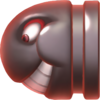 King Bill |
An enormous, invincible Bullet Bill that charges from the edges of the screen, destroying blocks in its path. | World 9-8 | 200 | ||
 Boo |
Ghosts that follow the player when their back is turned, but hide their faces when they look at them. They can only be defeated with a Star. They normally cannot be seen in the dark, though they produce a glowing trail when pursuing the player. In World 5- |
World 3- |
World 7- |
200 | — |
 Big Boo |
Large Boos that retain the same behavior and properties as their smaller counterparts. Their large size allows them to obscure objects placed behind them. | World 3- |
World 7- |
200 | — |
 Amp |
Stationary, electric balls that shock the player upon contact. | World 3- |
200 | — | |
 Bob-omb |
Bombs that ignite if they are jumped on or come into contact with fireballs, then explode shortly after. When ignited, they can be picked up and thrown to defeat other enemies. Some are found being shot from cannons while other are found locked in ice and require nearby explosions to detonate. | World 3- |
World 9-4 | 200 | — |
 Parabomb |
Parachuting Bob-ombs that descend from the sky, transforming into normal Bob-ombs once they land. | World 8-5 | 200 | — | |
 Huckit Crab |
A crab that throws sand balls on loop, jumping backwards every time it does so. These balls can be jumped on and used as a temporary platform. | World 4-3 | 200 | ||
 Blooper |
Squid-like enemies that move in an erratic pattern and follow the player. They are often found concealed behind foreground elements, emerging once the player draws near. | World 4-4 | World 8-4 | 200 | — |
 Blooper Nanny |
Bloopers that have Blooper Babies swimming in a trail behind them. They normally chase the player like an ordinary Blooper, though they will occasionally pause and deploy their Blooper Babies before spawning a new set. | World 4-4 | 200 | — | |
 Scaredy Rat |
An enemy that walks forward in a group. When one of the rats is jumped on, the rest panic and run around, calming back down once they encounter a calm rat. | World 4- |
200 | ||
 Mechakoopa |
A mechanical version of Bowser found in Airship levels. After stomping on it, it becomes stunned and can be picked up and thrown to defeat other enemies before it wakes up. | World 4- |
World 8- |
200 | — |
Wiggler |
Caterpillars that become agitated and move faster after being jumped on. | World 5-2 | 200 | — | |
Big Wiggler |
Large variants of Wigglers that can traverse poison and defeat enemies they run into. They do not become agitated when stomped and can be bounced off of like a spring. | World 5-2 | — | ||
 Swoop |
Bats that hang onto the ceiling, then swoop towards the player when approached. In World 6-6 they have eyes that glow in the dark. | World 5-2 | World 6-6 | 200 | — |
 Bramball |
A forest enemy that lurches between available platforms. It is mostly covered in spikes, with the head being the only safe part to jump on. It can also be forced to move if jumped into from below. Fast-moving individuals appear at the end of their respective level. | World 5-3 | 200 | ||
 Big Chain Chomp |
This Chain Chomp was enlarged by Magikoopa before the second boss battle with Iggy. It is fastened to a chariot that holds Iggy and is screwed to a track. The Big Chain Chomp lunges at Mario during the boss battle and drags Iggy with it. Hitting Iggy causes the Big Chain Chomp to become enraged and lung at Mario more quickly. Defeating the Koopaling causes the Big Chain Chomp to revert to its original size before disappearing. | World 5- |
200 | — | |
 Chain Chomp |
Enemies tied to posts that lunge at players at regular intervals. If their post is ground pounded three times, they are set free and can be used to break through blocks. | World 7-2 | 200 | — | |
 Monty Mole |
A mole that pops out of the ground and gives chase, bouncing off of other moles they come in contact with. | World 6-4 | World 8- |
200 | — |
Rocky Wrench |
Monty Moles that periodically pop out of holes in Airships to throw damaging wrenches at the player. | World 6- |
200 | — | |
 Fuzzy |
Enemies that follow tracks and hurt players upon contact. If they fall off a track, they will twirl in the air. | World 7-3 | World 9-8 | 200 | — |
 Big Fuzzy |
A large Fuzzy that follows tracks and hurts players upon contact, like its smaller counterpart. | World 7-3 | World 9-8 | 200 | |
 Broozer |
A boxing ghoul-like monster that clumsily charges towards the player's horizontal position, breaking through blocks in its path. The player can defeat it by jumping on it three times, or by hitting it with a fireball. It functions similarly to Chargin' Chucks in Super Mario World. | World 7- |
200 | — | |
 Crowber |
Birds that circle above the player before swooping down to attack and leaving the screen. | World 7- |
World 8-5 | 200 | — |
 Foo |
A cloud enemy that blows temporary fog in order to obscure the player's view. | World 7-5 | 200 | ||
 Bulber |
An aquatic enemy with a glowing esca that illuminates the dark immediately surrounding it. It swims forward endlessly. | World 8-4 | 200 | ||
 Jellybeam |
An aquatic enemy that produces a beam of light that illuminates the dark below it. They periodically descend and widen their light beams, speeding up when the player approaches. | World 8-4 | 200 | ||
Obstacles
| Name | Description | Galaxies | |
|---|---|---|---|
| First | Last | ||
Ash |
An enormous, red and black cloud that moves to the right very slowly. It instantly causes the player to lose a life upon contact. | World 8-1 | |
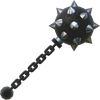 Ball 'n' Chain |
A large spiked ball attached to a rotating chain. | World 3- |
World 4- |
 Banzai Bill Cannon |
Turrets that shoot Banzai Bills. In World 7- |
World 7- |
World 7-4 |
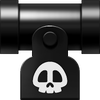 Bill Blaster |
Turrets that shoot Bullet Bills and become inactive when the player is nearby. Some can extend up and down while others are stationary. | World 3-2 | World 9-3 |
Bill Blaster Turret |
Stacks of Bill Blasters that rotate and shoot Bullet Bills in alternating directions. They continue firing when the player is nearby. | World 6-1 | |
 Bowser's Fireball |
These flames first appear offscreen while the player character is approaching Bowser in World 8- |
World 8- | |
Burner |
Mechanical obstacles that shoot streams of fire. Some spew fire constantly and can rotate while others spew fire periodically and are stationary. | World 4- | |
 Cannon |
Cannons that shoot projectiles. Bob-ombs come out of rotating ones, while cannonballs are shot out of fixed ones. | World 4- |
World 8- |
 Electrical field[16] |
Electrical barriers which shock the player or Bowser Jr. upon contact. In order to deal damage to Bowser Jr. during his second boss fight, he must be forced to make contact with the rails. | World 6- | |
Fire Bar |
A series of fireballs that spins in a circular motion around a block. They can vary in length and extend in one or two directions from the center of the block. | World 8- |
World 8- |
 Ghost Block |
A ? Block that, when approached, glows purple, levitates, and charges at the player, breaking if it hits a floor or a platform. Unlike regular ? Blocks, their question marks are not animated. | World 7- | |
 Ghost Vase |
A stand that, when approached, glows purple and throws itself at the player, breaking if it hits a floor or a platform. | World 3- |
World 4- |
Giant cannon |
Horizontal, pipe-sized cannons shoot giant cannonballs. | World 8- | |
 Giant Skewer |
Giant skewers appear in World 6- |
World 6- |
World 7- |
 Giant Spiked Ball |
Large spiked balls that roll along the ground. | World 8-2 | |
 Huge Icicle |
Large Icicles that fall and act as platforms. If the ground beneath them disappears, they will fall a second time. | World 3-3 | World 3- |
Icicle |
Damaging icicles that appear in frozen levels. Some, which are darker in coloration, are stationary while others, which are lighter in coloration, fall when the player approaches before reforming. | World 3-3 | World 3- |
Lava |
Molten rock that can cause the player to instantly lose a life upon contact. In some levels, lava rises and falls like they tide, making certain portions of the levels accessible for brief periods of time. | World 1- |
World 9-6 |
Lava Geyser |
Lava that rises up from pits periodically. Unlike normal lava, it does not cause the player to instantly lose a life upon contact. | World 8-1 | World 9-6 |
 Moving torch[17] |
Cannon-like Burners that pivot back and forth. | World 4- | |
Poison |
A liquid hazard that can cause the player to instantly lose a life upon contact. | World 5-2 | World 5-4 |
 Quartet-cannon |
Rotating four-way cannons can shoot up to multiple cannonballs at a one, two if facing ordinal and three if facing cardinal. A giant one contains a Warp Pipe that can only be entered when it is pointed upwards. | World 8- | |
 Quicksand |
Sand that slows the player down and causes them to sink when entered. Some pits containing quicksand lead the player to secret areas. | World 2-2 | World 2-5 |
Sandstorm |
Desert winds that blow in intervals. During a sandstorm, coins are blown through the air and ladders are shifted. The player character is pushed rightward as well, though they are not moved if they crouch. | World 2-4 | |
 Skewer |
Spiked pillars that periodically extend. | World 4- |
World 7- |
 Spell |
Magic projectiles launched by most of the Koopalings and Magikoopa. Most are launched by bosses, but they are cast offscreen in the platforming portions of World 2- |
World 1- |
World 8- |
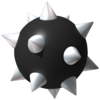 Spike Ball |
Spike balls that roll along the ground, destroying blocks and defeating enemies in their path. | World 2-2 | World 8-2 |
Spikes |
Pointy, stationary obstacles that damage the player upon contact. | World 2- |
World 6- |
 Volcanic debris |
Rocks periodically ejected by volcanoes that slowly rain from the sky and break upon hitting a solid surface. They also destroy blocks they come into contact with. They appear in two sizes. | World 8-1 | World 8-2 |
Bosses
The Koopalings return to the Super Mario series as the main antagonists in this game. They are fought in all of the Tower and Castle levels, with their magic wands being their main way of attack, and utilizing obstacles.
| Name | Description | Levels | |
|---|---|---|---|
| First | Last | ||
| The Koopalings | |||
 Larry |
The player needs to jump on Larry three times while dodging his magic blasts. In the second fight, he is on rising platforms that make it harder to gauge jumping. | World 1- |
World 1- |
 Roy |
The player needs to jump on Roy three times while jumping to avoid getting stunned. In the second fight, he hides in pipes. | World 2- |
World 2- |
Lemmy |
The player needs to dodge Lemmy's balls and jump on him three times in both fights. In the second fight, the ball he is on is bigger, so the player has to jump higher. | World 3- |
World 3- |
 Wendy |
The player needs to jump on Wendy three times while avoiding rings, and in the second fight she should be avoided when the water is up. | World 4- |
World 4- |
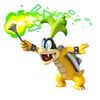 Iggy |
The player needs to jump on Iggy three times while dodging his fast magic blasts. The second fight is very different—a Big Chain Chomp pulls Iggy on a chariot. | World 5- |
World 5- |
 Morton |
The player needs to jump on Morton three times while dodging the pillars and jumping to avoid getting stunned. In the next fight, Morton causes columns to rise up using a Ground Pound, and the player instantly loses a life if it flattens them. | World 6- |
World 6- |
 Ludwig |
The player should jump on Ludwig three times when he comes down from his flight. In the next fight, there are elevators, making the fight more convoluted. Ludwig is very skilled, using homing magic blasts in the first fight and multiple magic blasts in the second. | World 7- |
World 7- |
| Other bosses | |||
 Bowser Jr. |
Bowser Jr. returns from his appearance in New Super Mario Bros., this time as a secondary antagonist in this game. Instead of fighting on his own, he uses his Koopa Clown Car in battles. He is the boss of Airship levels. | World 4- |
World 8- |
 Magikoopa |
Magikoopa appears as a secondary antagonist in this game. He mainly assists the villains in the beginning of their fights by using his magic wand to either transform the arena, or to enlarge obstacles and enemies. He is the boss of World 8's tower. The player needs to jump on Magikoopa three times while dodging many enemies and magic blasts. | World 8- | |
 Bowser |
Bowser, like his son, returns from his appearance in New Super Mario Bros. as the main antagonist and final boss in this game. He is the second boss fought in World 8 and the final boss, where he is fought in two phases: the first phase is fought in the same manner as the original Super Mario Bros., and the second is a chase where Bowser is turned into a giant by Magikoopa. | World 8- | |
Items and objects
Items
These are collectibles, pickups, and health-restoring objects.
| Name | Description |
|---|---|
 Coins |
Common collectibles that are typically found floating in the air or concealed in blocks and are often used to indicate paths. They have a dedicated counter which grants every player character, even those without lives, an extra life when it hits one hundred. In Coin Battle, they are used to determine the player character's ranking. |
Hidden Coins |
Invisible coins that become exposed once a player character passes over them. Only then can they be collected. |
 Red Coins |
Coins that have the same value as regular coins though are only revealed during the effects of a Red Ring. |
 Blue Coins |
Coins that have the same value as regular coins though are only revealed during the effects of a P Switch. An offscreen audience will clap for the player character if they manage to collect every Blue Coin revealed by a given P Switch. |
 Star Coins |
Three Star Coins are located in every course in hard-to-reach or hidden areas. They normally appear golden and appear grayed-out if previously collected. They are used to buy hint movies in World 1- |
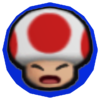 Toad balloons |
An item exclusively found in Enemy Courses in groups of eight. They must all be collected in order to clear the course, upon which all remaining enemies will vanish and a chest containing a captured Toad will appear. |
 Keys |
A key is awarded to the player character character after they defeat a castle boss. Picking it up completes the level and unlocks the next world. |
 1-Up Mushrooms |
A mushroom that gives player characters an extra life. Like Super Mushrooms, they slide along the ground once released, turning at walls. They are often hidden within Invisible Blocks or placed in hard-to-reach areas. |
 Koopa Shells |
Koopa Troopas temporarily retreat into their shells when stomped, which can then be kicked, picked up, or thrown. They bounce off of opposing walls and can damage the player character character on the rebound, but they can be stopped with a well-timed jump or fireballs. |
 Buzzy Shells |
These work like Koopa Shells, but they are impervious to fire. Fireballs cannot stop them. |
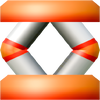 Springboards |
A spring that player characters automatically bounce off of. If a player character jumps the moment they land on a Trampoline, they can gain additional height. It can be picked up and carried around. Trampolines can be thrown further with a running start. |
 Barrels |
These barrels can be picked and tossed, causing them to roll on the ground and defeat enemies in their path. |
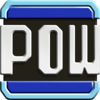 POW Blocks |
A block that, after being thrown and hitting the ground, causes a large tremor that defeats grounded enemies and dislodges floating coins and Star Coins. |
 Propeller Blocks |
A block that can be carried, granting the carrier the abilities of the Propeller Mushroom. Like Glow Blocks, they can be thrown at enemies to defeat them, though they do not slide like carry-able Ice Blocks. |
 Glow Blocks |
A block that illuminates the surrounding Dark and can be carried around. They can also be thrown at enemies to defeat them, though they do not slide like carry-able Ice Blocks. Glow Block continue to illuminate their surroundings even when held in a Yoshi's mouth. |
 Ice blocks |
Ice Blocks can temporarily be created whenever player characters freeze an enemy with an ice ball. These blocks can be used as sliding weapons when thrown, breaking if they hit a surface with enough speed. |
 Yoshi's Eggs |
An egg that is either released from a block, in which case the egg will hatch a Yoshi or Super Mushroom if every player character has a Yoshi, or laid by a Yoshi after it eats five fruits, in which case the egg will hatch a 1-Up Mushroom, coins, or a power-up. |
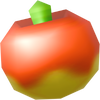 Fruits |
A fruit which Yoshis can consume, even without needing to extend their tongues. After a Yoshi eats five fruit, it will lay an egg. Fruit are sometimes found growing on bushes and palm trees in the levels Yoshis appear in. |
Power-ups
| Power-up | Form | Description | |
|---|---|---|---|
| N/A |  Small Mario |
 Small Luigi |
The player character's weakest form. They start each life in their Small form. If they are touched by an enemy or obstacle, they lose one life. |
Small Yellow Toad |
Small Blue Toad | ||
 Super Mushroom |
Super Mario |
Super Luigi |
A power-up that transforms player characters into their Super form if they are in their Small or Mini form and otherwise only grants points. They slide along the ground once released, turning at walls. They are typically only released from blocks when a player character in their Small or Mini form is present. In Coin Battle, they periodically float into the screen within bubbles. |
Super Yellow Toad |
Super Blue Toad | ||
 Fire Flower |
Fire Mario |
 Fire Luigi |
A power-up that transforms player characters into their Fire form. They bob in place once released. |
Fire Yellow Toad |
Fire Blue Toad | ||
 Propeller Mushroom |
Propeller Mario |
Propeller Luigi |
A power-up that transforms player characters into their Propeller form. Once released, they float towards the right in a sine wave pattern before flying away if uncollected. |
Propeller Yellow Toad |
Propeller Blue Toad | ||
 Ice Flower |
Ice Mario |
Ice Luigi |
A power-up that transforms player characters into their Ice form. They bob in place once released, like Fire Flowers. They are often found in fortresses and castles. |
Ice Yellow Toad |
Ice Blue Toad | ||
 Penguin Suit |
Penguin Mario |
Penguin Luigi |
A power-up that transforms player characters into their Penguin form. They slowly waddle about once released, turning at walls. They are primarily found in the World 3 and World 4. |
Penguin Yellow Toad |
 Penguin Blue Toad | ||
 Mini Mushroom |
 Mini Mario |
 Mini Luigi |
A power-up that transforms player characters into their Mini form. Like Super Mushrooms, they slide along the ground once released, turning at walls. They are very rare, though they always appear in levels where they are required to collect Star Coins. |
 Mini Yellow Toad |
 Mini Blue Toad | ||
 Star |
Invincible Mario |
Invincible Luigi |
A power-up that transforms player characters into their Invincible form. They bounce around once released, turning at walls. Certain Stars can only be obtained from ? Blocks if the player character is already in their Invincible form; otherwise, these ? Blocks will release coins instead. |
 Invincible Yellow Toad |
 Invincible Blue Toad | ||
Objects
Objects are interactable elements of the environment that cannot be picked up or collected by Mario. For objects that primarily function as obstructions or hazards, see above.
| Name | Description | |
|---|---|---|
| Blocks and containers | ||
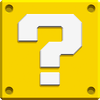 ? Block |
A block that is guaranteed to hold contents, typically coins or power-ups, but also occasionally other items and imprisoned Toads. Power-up-containing ? Blocks release as many power-ups as there are player characters present. Some ? Blocks are Coin Blocks that release up to ten coins when struck in succession. A few are hidden and only become visible when struck. | |
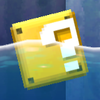 ? Block (floating) |
Giant ? Blocks that float on the surface of water in World 6-5. | |
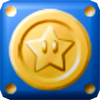 Block (hint movies) |
A block present in Peach's Castle that, when hit, opens up the hint movie selection window. | |
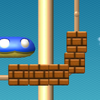 Block (railed) |
? Blocks and Bricks that travel along tracks. | |
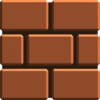 Brick |
A block that may or may not hold contents. Empty bricks break when hit if the player is at least in their Super form. Bricks with contents behave like ? Blocks, though they will always release a single item regardless of how many players are present. Like ? Blocks, some Bricks are Coin Blocks and Hidden Blocks. | |
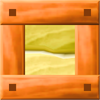 Crate |
Wooden boxes that break when Ground Pounded or struck by a tossed item. They often block paths, though some contain helpful objects like coins and power-ups. | |
Donut Block |
A semisolid platform that turns orange and begins to shudder if a player stands on it and falls if the player does not move out of the way. After having fallen, the block will shortly respawn in its original position. Players in their Mini form cannot make Donut Blocks fall. | |
Dotted-Line Block |
An intangible block that transforms into a tangible Red Block after activating the ! Switch in World 3. | |
 Flying ? Block |
A ? Block with wings that flies back and forth in a sine wave pattern. Hitting it removes its wings and ability to move, transforming it into a generic Empty Block. | |
 Gray Block |
A stone block that can only be broken by explosions, enemy attacks, and certain obstacles. They are normally used to guard Star Coins. | |
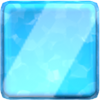 Ice Block |
Naturally-occurring Ice Blocks also appear in some levels and usually in clusters. These blocks are slippery platforms. | |
 Ice Snake Block |
A slippery type of Snake Block that follows a set path. Unlike other moving platforms, Ice Snake Blocks begin moving the moment a player steps on one without waiting for other players to catch up. | |
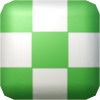 Jump Block |
A block that players automatically bounce off of. If a player jumps the moment they land on a Jump Block, they can gain additional height. Unlike their Note Block predecessors, Jump Blocks never contain coins or items. | |
 Roulette Block |
A block that rapidly cycles through various items. When hit, the item currently displayed on the block is released. Like ? Blocks, Roulette Blocks release as many items as there are players present. | |
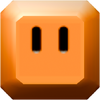 Stretch Block |
A semisolid platform that periodically alternates between moving vertically in one direction while contracting horizontally into one segment and moving vertically in the other direction while expanding horizontally into five segments. | |
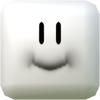 Square cloud |
A square cloud that, when hit, transforms into a coin-throwing Lakitu that temporarily remains on-screen. | |
 Super Guide Block |
A block that appears outside World 9 after the player dies eight times in a stage, regardless if they have visited another stage. When hit, Luigi automatically clears the stage. If | |
 Treasure chest |
Toads are trapped in treasure chests and award the player character Super Mushrooms when freed. Chests also appear in yellow Toad Houses, in which they always contain a Star. | |
| Trigger objects | ||
 ! Switch |
A pair of ! Switches can be found on the Frozen World map; the upper switch transforms all Dotted-Line Blocks into Red Blocks and the lower switch has the opposite effect. Another pair of ! Switches can be found in World 8- | |
 ? Switch |
A switch with effects that vary between levels. These effects are either permanent or temporary. They may be found hidden in blocks. | |
 Large ! Switch[18] |
The second ! Switch in Bowser's Castle is much larger and causes Super Bowser to drop into a pit while draining the lava he is standing in. | |
 P Switch |
A switch that temporarily transforms empty bricks into coins and vice versa, in addition to revealing Blue Coins. They may be found hidden in blocks. | |
 Red Ring |
When a player touches a Red Ring, eight Red Coins temporarily appear. If all eight coins are collected before they disappear, all players in their Small or Super form will receive a power-up, which varies in between levels, while all players in any other form will receive a 1-Up Mushroom. | |
 Screw |
Big screws that cause nearby platforms to move when spun. Some platforms have screws directly in them that function the same way. | |
| Pipes | ||
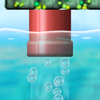 Bubble-jet pipe[19] |
These underwater pipes expel strong currents that push the player character. | |
 Pipe |
Pipes going through the ground that transport the player to new areas. | |
 Pipe (quartet-cannon) |
This Warp Pipe is found only in World 8- | |
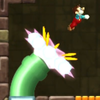 Pipe Cannon |
Pipes that launch the player to another location or a hard to reach platform. | |
Small pipe |
Mini variants of warp pipes that can be accessed with a Mini Mushroom. | |
| Climbable objects | ||
Cliff |
Narrow ledges that Mario can either sidestep or cling to. Normal movement is restricted on cliffs. | |
Fence |
Double-sided fences that the player can climb on and punch to defeat enemies on the opposite side. Some move along set paths. | |
 Fence wheel[20] |
Large fences that spin through lava. | |
 Flip panel |
Fence gates that rotate when punched, flipping players and Climbing Koopas to the opposite side of the fence. | |
 Flip panel (big) |
A wide flip panel. It functions like the smaller ones, but its large size can help Mario avoid certain hazards and enemies. | |
Hanging chain |
Chains that Mario can swing back and forth on like a rope swing. | |
Hanging vine |
Hanging vines of varying lengths in forest-themed levels. They function like rope swings. | |
Pole |
The player character clings to a pole by jumping on it. They can move up or down it with | |
Remote-Controlled Fence |
A fence that the player can tilt left and right in a 180-degree arc by tilting | |
Rocky wall |
Rocky walls can be climbed like vines but with more horizontal breath. They are found in mountainous levels. | |
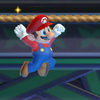 Rope |
Taught rope that Mario can cling to like monkey bars and travel along to reach distant areas. | |
Rope ladder |
A ladder used to climb atop and descend from bridges. Players get knocked off rope ladders when they sway in the wind. | |
Vine |
Climbable beanstalks that often lead to aerial sub areas. They are concealed within blocks, sometimes Invisible Blocks, which must be hit to make them emerge. They emerge upwards unless the block containing them is Ground Pounded, which causes them to grow downward. Hard Blocks block their growth. | |
| Platforms | ||
Arrow lift |
A lift that appears blue when idle but turns red when activated. | |
Bolt Lift |
A set of nuts that are screwed onto a very long bolt that serve as platforms. The player must continually jump to avoid falling. | |
Bouncy Cloud |
Cloud platforms that make the player and enemies bounce very high. | |
 Circus ball |
Bouncing balls that are summoned by Lemmy Koopa in his boss battles or appear as Castle obstacles. They can be bounced off of to reach higher areas. | |
 Cog |
Gear-like platforms that the player must travel in-between to pass. If they are trapped between two cogs, they are squished and lose a life. Continuing to ride a gear upwards may lead the player to a secret area. | |
Conveyor Belt |
Moving platforms that carry the player from one place to another without them having to move at all. | |
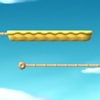 Flatbed Ferry |
Lifts that travel along tracks. Some tracks are self-connected or lead to a rounded end that sends the Flatbed Ferry back the way it came. Others lack an obstruction at the end, causing the lift to fall. | |
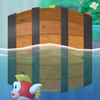 Floating barrel[21] |
Narrow platforms that float in water. They gently sink while Mario is on top of them. | |
 Half-circle rock |
Rock platforms that wobble from left to right when the player stands towards one of its edges. | |
 Hanging platform[22] |
Broad platforms that tilt under Mario's weight. | |
 Ice platform |
Icy cylindrical platforms that float on water. | |
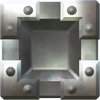 Iron Block |
A heavy box that moves along and drops from Conveyor Belts. They are indestructible and crush players they fall on top of. | |
 Large shell[23] |
Massive Koopa Shells partially embedded in the ground of World 5-1. They can be physically stood on and entered, revealing concealed coins and other items of interest. | |
Lift |
Floating, moving platforms. | |
 Light Block |
Light Blocks are platforms in dark areas of World 5- | |
Limited Lift |
A lift that the player can travel with a limited capacity of at least five enemies. It stops once the counter reaches 0. | |
 Mushroom Platform |
Tall, broad mushrooms that make up narrow platforms in the sky. There are a diversity of different types. | |
Paddle Platform |
A paddle wheel-like platforms made of 4 smaller platforms that moves in a wheel on tracks. | |
 Palm tree |
Trees of varying heights that serve as platforms. Some bear fruit. | |
 Pendulum Platform |
Chained platforms that sway from side to side indefinitely. | |
 Raft |
A pair of lamps attached to a raft that the player can tilt to see in the dark by tilting | |
Remote-Control Platform |
A lift that the player can tilt and move on tracks by tilting | |
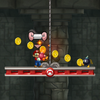 Remote-Controlled Elevator |
Girder-like lifts that begin to rise once a player character is on top of it. The player can tilt the elevator with | |
 Remote-Controlled Lift |
Flatbed Ferries that can be physically shifted by the player when a corresponding ! Block[24] is pressed. The lifts are shifted by moving | |
Rolling log |
Cylindrical wooden platforms that, when stood on, roll over. The player must run along them or jump carefully to avoid falling off until they reach their destination on a set path. | |
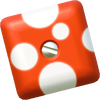 Rotating square[25] |
A mushroom block that spins clockwise or counter clockwise. | |
 Sand Geyser |
Sand that periodically rises up from pits, acting as a temporary platform. Entities that make contact with the sides of a Sand Geyser are forced to the top. | |
 Scale Lift |
Scale-like platforms that the player lands on one platform, the parallel one rises. It will fall off if they stand on it for too long. | |
Screwtop Lift |
A lift with a screw that the player can move in a set direction by spinning. | |
 Screwtop Shroom |
A rare Mushroom Platform that only appears in World 1-5. When spun on, it lowers another lift's height. | |
Slow falling platform |
Bony lifts that are varied of length. It acts similar to Flimsy Lifts, but fall slower. | |
Spine Coaster |
Rideable creatures made of bone used to aid Mario and company to pass through lava pits. | |
 Stretch Shroom |
Mushroom Platforms that contract and extend at constant intervals, pulling anything and any player on the ends of the platforms to the center when they contract. | |
Swing |
Lifts that sway back and forth like pendulums. Some move through lava as they swing and spiked balls roll along them. | |
Swinging Hammer |
Hammer-like platforms that swing back and forth in a 180° arc. | |
Tilt Lift |
A lift that the player can tilt by tilting | |
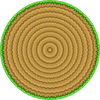 Turning Floor |
Continually moving objects that turn clockwise or counterclockwise, moving anything on them. | |
 Unstable mushroom |
Mushroom Platforms that tilt back and forth on their own. | |
 Water Ball |
A huge mass of water that floats in the air. Acts as if Mario and co. are in water. They are found only in World 7-2, along with Chain Chomps. | |
Yellow walkway[26] |
Ledges similar to Donut Blocks. They fall if the player character stands on them too quickly. | |
| Other objects | ||
 Ceiling[27] |
Block-like objects in the ceiling that are pushed down by rolling spiked balls. They move back into place once the spiked ball rolls off. | |
 Door |
Doors bring the player character to another area when | |
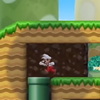 False wall |
Hidden alcoves found throughout many levels. False walls often conceal blocks, pipes, or Star Coins. | |
 Flower |
Flora that release coins when spun in front of. Six color variants appear thought the game; three appear in both World 1 and World 7 while the other three appear in the World 5. | |
 Midway point |
A flag that acts like a checkpoint and appears near the middle of most levels outside of World 9. It has Bowser's insignia, but if a player touches it, the insignia is replaced by the player's symbol. If that player character is in their Small form, they transform into their Super form. | |
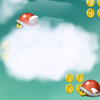 Mist |
Dense mist that obscures the player's view and conceals objects. They can temporarily be blown away through various means, such as Spin Jumping. Enemies sometimes are concealed in mist. | |
Pole (goal) |
A flagpole bearing a black flag with a white skull emblem. Must be touched by the player to complete the level. Only appears in levels with no bosses. | |
Pole (secret goal) |
Hidden poles and mark a secret exit for some levels. They bear red flags instead of black ones. | |
 Remote-Controlled Clown Car |
A Clown Car that allows the player character to fly and bump into Bowser Jr. during battle. Attempting to Spin Jump while riding a Remote-Controlled Clown Car will give the rider a speed boost instead. | |
 Trick door |
Some of the doors found in Ghost Houses are illusions crafted by Boos. Attempting to open one makes it disappear and releases a coin. | |
Media
- For a complete list of media for this subject, see List of New Super Mario Bros. Wii media.
| File info 0:08 |
| File info 0:30 |
| File info 0:30 |
| File info 0:30 |
Staff
- Main article: List of New Super Mario Bros. Wii staff
Nintendo Entertainment Analysis and Development developed the game, with the director being Shigeyuki Asuke and the producers being Takashi Tezuka and Hiroyuki Kimura.
Development
As demonstrated by development information for various games, Shigeru Miyamoto had been struggling to add simultaneous multiplayer to Super Mario games for a long time. He tried to experiment with multiplayer aspects at the start of most of his Super Mario projects, as can be seen in pre-release screenshots of games such as Super Mario 64 DS and New Super Mario Bros.: different multiplayer aspects were evidently intended for both of those games during early stages of development. When the experiments with multiplayer failed to come to fruition, in part due to technical limitations, the developers refocused on what they were used to, single-player; for both of the aforementioned games, multiplayer was put on the back-burner and was only used in in-engine side modes and unrelated minigames. The Wii's hardware allowed Miyamoto to ensure that the game could process all loaded items and enemies at once, and have the camera focus on all players.[28]
New Super Mario Bros. Wii was developed as the flagship title for Super Guide. This feature first surfaced as a June 30, 2008 patent for a "Kind Code" with three demo play modes: Game, in which, when the player gets stuck during standard gameplay, they can view a walkthrough video that appears in the screen's top right corner; Digest, in which the player watches developer gameplay and can join the game at a particular point, but cannot save; and Scene Menu, in which players go directly to specific parts of the game without loading their games or watching the digest.[29] Super Guide uses the Digest mode, and hint movies appear to use the Scene Menu mode.
In a 2010 interview with Nintendo Power, director Shigeyuki Asuke discussed several aspects of the game's development.[30] The development team considered adding vehicles which allowed the player to move freely and objects that were controlled by tilting the Wii Remote. These ideas were simplified so that they were more easily understood and better complement the core gameplay, leading to the creation of the Propeller Mushroom and Penguin Suit. In regards to the final battle with Bowser, the developers wanted to make it really feel like a final boss by making Bowser huge, giving him the ability to break through walls, and making a switch that collapses the floor under him the only way of defeating him. A static arena could not facilitate this battle, so it was turned into a platforming stage. The textures of Bowser's eyes and hair were also changed to add to the effect. World 9 was designed to challenge players who have conquered the rest of the levels while still being fun to play. The Midair Spin was added to make use of the Wii Remote's features. The Koopalings and Airships were added because of their nostalgic value and they act as distinct set pieces. The inclusion of Yoshis was decided early in development with Asuke imagining players fighting over one Yoshi. However, Yoshis greatly change the way levels are played, so they are limited to a few levels. Yoshis were added to levels if they made the levels more fun to play.
Pre-release and unused content
During development, Princess Peach was planned to be a playable character. This idea was scrapped because the Toads better suited Mario's stature and the need for special programming to handle the physics of the dress. The development team wanted the game opening sequence to be more dramatic, causing a dispute between them and Shigeru Miyamoto.
In the game's E3 2009 trailer, it shows an early design of the motion-controlled platforms in World 7-4. They lack they indicator which shows the player in control of the platforms and do not make a sound when they travel on the tracks. The bottom of the platforms are also less round compared to the final design. The tracks feature a simpler design, being completely black with red endpoints instead.
Glitches
- Main article: List of New Super Mario Bros. Wii glitches
Infinite Coins
The player needs an Ice Flower in World 4-![]() Castle and get to the place with the large flip panel with a Climbing Koopa on it. Mario must stand on the front side, then jump to throw an Ice Ball at the Climbing Koopa. The player must hold the fence again and spin the flip panel as fast as possible. The Climbing Koopa freezes, falls to the ground and drops infinite coins.
Castle and get to the place with the large flip panel with a Climbing Koopa on it. Mario must stand on the front side, then jump to throw an Ice Ball at the Climbing Koopa. The player must hold the fence again and spin the flip panel as fast as possible. The Climbing Koopa freezes, falls to the ground and drops infinite coins.
Infinite lives
At least two players must enter a course containing both Yoshis and Koopa Troopas that allows the player(s) wishing to perform the glitch to equip a Propeller Mushroom; these courses are World 1-3, World 2-5, World 3-2, and World 6-4. After using a Yoshi to eat a Koopa Troopa, a Simultaneous Ground Pound must be performed, causing the Koopa Troopa within the Yoshi's mouth to enter an "invulnerable" state. Its shell can then be spat out and held while performing a Drill Spin, accruing enough lives to max out the life meter in seconds while only using a few Drill Spins.
Notable promotions
Trading cards
- Main article: List of New Super Mario Bros. Wii trading cards
Trading cards were released to promote the game's release. They feature various characters, enemies, items, and levels from the game. Each booster pack contains four regular cards and one each of Tips & Tricks, Standee, Foil, and FunTats.
Piano book
A book published by Alfred Music Publishing titled New Super Mario Bros. Wii: Simplified Piano Solos was released, containing sheet music for seventeen songs from the game.
Arcade adaptation
A Japan only arcade game developed by Capcom was released in 2011 called New Super Mario Bros. Wii Coin World.
Reception
The former Mario and Luigi voice actor, Charles Martinet originally stated that this game is his favorite Super Mario game of all time. His new favorite Super Mario game is Super Mario Maker.
| Reviews | |||
|---|---|---|---|
| Release | Reviewer, Publication | Score | Comment |
| Wii | Ryan Scott, Gamespy | 4.5/5 | "If you have friends who enjoy videogames, this is one to play together. It's made specifically for that -- and yeah, it's got all the painstaking collectibles and supplemental multiplayer challenges you already assumed it did, so you're going to play it for quite a while. And if you just want a serious challenge, play alone and revel in the pure joy of death. Either way, it's a damn fine Mario game. But I bet you already knew that." |
| Wii | Nick Chester, Destructoid | 9/10 | "Despite being feeling and looking somewhat familiar (which is definitely a positive in this case), New Super Mario Bros. Wii is one of your safest and best bet on the Wii this year." |
| Wii | Oli Welsh, Eurogamer | 9/10 | "Who knew that, locked in the time-honoured traditions of Super Mario Bros., one of the greatest co-op games ever was waiting to get out? Well, Shigeru Miyamoto did. In unleashing it, Nintendo hasn't moved its classic series forward one jot; it hasn't had to. But it has given it a riotous new lease of life." |
| Aggregators | |||
| Compiler | Platform / Score | ||
| Metacritic | 87 | ||
| GameRankings | 88.18% | ||
Sales
New Super Mario Bros. Wii is the 4th best-selling game on the Wii, having sold 30.32 million copies worldwide as of September 30, 2021.[31]
References to other media
- Donkey Kong: Broozers hit barrels when a player is near, rolling the barrel towards them, similar to Donkey Kong's ability to throw barrels in this game.
- Mario Bros.: The POW Block reappears and has the same design as in Mario Bros. The POW Block can also be carried. The first underground Coin Battle area in World
 Coin-1 also bears some resemblance to the Mario Bros. arena.
Coin-1 also bears some resemblance to the Mario Bros. arena. - Super Mario Bros.: The secret "Level Clear" tune and fireworks are taken from this game. The first tunes from the overworld theme is played during the beginning of the Staff Roll. The overworld theme is once again used as a cover for the Toad Houses. The underground theme is used as a cover for the volcano underground theme. The ending fanfare is covered when Magikoopa and Princess Peach are rescued in addition to when Mario and Princess Peach leave Bowser's Castle. Near the beginning of the game, Bowser Jr. states in a letter that he ordered his minions to stuff every Toad they see into a ? Block, which might be a reference to the fact that Bowser transformed them into ? Blocks, according to the instruction book. Also, Roy Koopa's Castle has three way corridors, with only one being the correct path. This puzzle mimics the puzzles in World 4-4, World 7-4, and World 8-4. World
 Coin-2 is nearly identical in layout to World 1-1 from this game. The secret corridor found above the ceiling near the end of World 1-2 is reminiscent of the empty corridor found above the ceiling in World 1-2.
Coin-2 is nearly identical in layout to World 1-1 from this game. The secret corridor found above the ceiling near the end of World 1-2 is reminiscent of the empty corridor found above the ceiling in World 1-2. - Super Mario Bros.: The Lost Levels: World 2-4 features wind. The extended version of the ending fanfare can be heard exclusively when Bowser is defeated in multiplayer.
- Super Mario Bros. 2: Grabbable objects, such as the POW Block, are typically held above the head, like in this game.
- Super Mario Bros. 3: The Penguin Suit is based on the suits in this game, mainly the Frog Suit. The Koopalings' battle theme is a cover and once again played when fighting against them. The Airship theme is a cover that plays on the Airships. The design on the Fortresses are based on the Fortress sprite in this game. Jellybeams resemble the in-game sprites of Jelectros. Stalking Piranha Plants resemble Ptooies whose behavior is largely given to River Piranha Plants. The Enemy Courses are similar to the levels when fighting against a Hammer Bro, Fire Bro, Boomerang Bro, or Sledge Bro and even use a cover of the song. Also, reserved power-ups can be used on the world maps. The game features an inventory window, rather than a summonable item, only accessible from the overworld, reminiscent of that of Super Mario Bros. 3. Most of the Koopalings are fought in the same kind of land they are, like in Super Mario Bros. 3. For example, Lemmy Koopa is in charge of the ice-themed world in both games, and Wendy O. Koopa is in charge of the water-themed world in both games. In addition, Power-up Panels is likely based on the card-matching minigame in this game. Toad Houses feature checkered floor tiles like those seen in this game's fortress and kings' chambers. Artwork of Mario holding a Green Shell resembles promotional artwork of Raccoon Mario holding a Green Koopa Troopa from this game. Artwork of a Spike throwing a spiked ball resembles its promotional artwork from this game.
- Super Nintendo Entertainment System: On the cover of the game disc (the side opposite with the part that reads the console), Mario, Luigi, Blue Toad, and Yellow Toad are positioned in the same way that the buttons on the European and Japanese SNES controller are.
- Super Mario World: New Super Mario Bros. Wii is the first game in the 2D Super Mario series to use this game's variant of the power-down sound while still keeping the original Super Mario Bros. sound effect for entering and exiting pipes, as well as the first to use a Coin sound effect similar to this game's. The design on the Fortress doors leading to the boss is similar. Yoshis reappear, along with the sound heard when mounting onto Yoshi and the drumbeat that is added to the music, similar to this game. Parts of the castle BGM can be heard in the castle levels. The sound effect that plays when the invincibility wears off is taken from the Switch Block when the activation is going to stop, as well as the sound that plays when the Super Star power-up runs out. The World 9 is similar to the Star World and the Special Zone. Also, World 3 has a switch that activates blocks, similar to the Switch Palaces in this game, without having to go through a level. Almost the entirety of World 7-
 Castle can be skipped by finding the secret exit in World 7-
Castle can be skipped by finding the secret exit in World 7- Tower and completing World 7-6, like how the Back Door can be accessed by finding the secret exit in Valley of Bowser 2 and completing Valley Fortress. The Koopa Clown Car returns. World 4-Castle, whose boss is Wendy O. Koopa, features Skewers, much like #6 Wendy's Castle. River Piranha Plants resemble Jumping Piranha Plants. Jumbo Rays don goggles resembling those of Blurps and Dolphins. King Bills are shortened in length like the Banzai Bills from this game. Some members of Circling Boo Buddies make the same facial expressions as Boos in this game. Boos also circle around Ghost Houses like in this game. Artwork of Mario jumping with a Green Yoshi resembles this game's box art. Artwork of Blue Toad riding a Pink Yoshi resembles promotional artwork of Yoshi eating a berry from this game. Artwork of Bowser resembles his promotional artwork from this game.
Tower and completing World 7-6, like how the Back Door can be accessed by finding the secret exit in Valley of Bowser 2 and completing Valley Fortress. The Koopa Clown Car returns. World 4-Castle, whose boss is Wendy O. Koopa, features Skewers, much like #6 Wendy's Castle. River Piranha Plants resemble Jumping Piranha Plants. Jumbo Rays don goggles resembling those of Blurps and Dolphins. King Bills are shortened in length like the Banzai Bills from this game. Some members of Circling Boo Buddies make the same facial expressions as Boos in this game. Boos also circle around Ghost Houses like in this game. Artwork of Mario jumping with a Green Yoshi resembles this game's box art. Artwork of Blue Toad riding a Pink Yoshi resembles promotional artwork of Yoshi eating a berry from this game. Artwork of Bowser resembles his promotional artwork from this game. - Donkey Kong Country: The animal buddy mechanics used in this game, are used on the Yoshis; players can only use Yoshi in certain levels, and they ditch him after clearing the level.
- Super Mario World 2: Yoshi's Island: Just before the main boss of the world, Kamek appears and flies all over the room, using his magic on the room and boss. Fake walls reappear. The room Kamek's battle takes place in is similar to the final room of King Bowser's Castle, containing autoscrolling blocks that can be transformed by Magic spells. Kamek turns Bowser into a giant for the final battle. Bubbles reappear to protect players from harm, as they did for Baby Mario. The dark also makes a reappearance in several levels. The introduction to the castle boss theme is a shortened cover of the introduction to the boss theme from this game. Bowser Jr.'s final battle involves a floor that can be Ground Pounded to produce shockwaves, like the floor involved in Baby Bowser's initial fight. Giant Goombas and Hefty Goombas split into their immediately smaller counterparts like Mildes.
- Super Mario 64: "Inside the Castle Walls" is played inside Peach's Castle. Also, when the mini-game Power-up Panels is lost (when the player gets two Bowser or Bowser Jr. cards), the short tune heard when trying to enter a locked door is played here. In the same vein, winning a Toad House mini-game plays an arrangement of the course clear fanfare. The fanfares for clearing a tower, castle, or airship are rearrangements of the "Koopa Clear" fanfare. When the player goes into a Warp Cannon or aims a cannon in 1-up Blast, cannon sounds from this game are heard. In both games, Chain Chomps are freed by Ground Pounding their posts three times. One Chain Chomp in World 7-2 may be freed to destroy a brick wall and uncover a Star Coin, which is reminiscent of how the Chain Chomp in Bob-omb Battlefield must be freed to uncover a jailed Power Star.
- Mario Kart 64: About 30 seconds in the Rainbow Path, a cover from the Rainbow Road theme can be heard.
- Super Mario Sunshine: When Iggy is hit during his second battle, the Big Chain Chomp pulling his carriage becomes enraged and glows red like the Chain Chomp in Pianta Village.
- Mario Party 7: Luigi's artwork on the back of the Japanese cover art next to the Super Guide description is based on one of his artwork from this game.
- New Super Mario Bros.: New Super Mario Bros. Wii is a follow-up to this game. Most of the songs are covers of songs from this game, such as the overworld theme (and subsequently the snow theme), course clear theme, athletic theme, P Switch theme, tower and castle boss clear themes (and subsequently the airship clear theme), and multiplayer results theme. The introduction to the airship boss theme is a rendition of the introduction to Bowser Jr.'s battle theme from this game. The melody that plays during the intros to both games' desert themes are the same. A portion of the melody that plays 22 seconds into this game's volcano theme is reused in the outside volcano theme. The tower themes in both games are very similar. Certain renditions of older tracks in this game, like the underground theme from Super Mario Bros. are covered. The Mini Mushroom returns. Carrying objects underwater gives the player enhanced swimming speed while also restricting them to the surface, like in this game. Some text in New Super Mario Bros. Wii's instruction manual is reused from its instruction manual (for example, the "Blunders and Game Over" section in New Super Mario Bros.'s manual is reused in New Super Mario Bros. Wii's manual, except the word "whacked" is replaced with "clobbered"). Various pieces of promotional artwork are reused as are all eight world themes from this game. Vibrant-purple poison returns in forest levels. Unlike other mushrooms in New Super Mario Bros. Wii, the mushrooms seen on the world map of the Jungle World are colored like the Mushroom Platforms of this game. The broken fragments of ? Blocks, bricks, and Empty Blocks and the unused broken fragments of Hard Blocks and Red Blocks use the designs of their respective blocks from this game, though they appear distinct from this game's own block fragments.
- Yoshi's Island DS: Kamek turns Bowser into a giant for the final battle.
- Super Mario Galaxy: During the Staff Roll, an outtake of a Princess Peach voiceover states that she will wait for Mario at the night of the Star Festival, but she is interrupted by Bowser. The 1-up sound effect from this game plays when the player gets a 1-up in New Super Mario Bros. Wii, but only from the speakers of the Wii Remote. In World 9, multicolor star-shaped objects fall from the sky, like Star Bits. The Ice Flower returns from this game, but has a different function (in Super Mario Galaxy, Ice Mario can walk on liquid and in New Super Mario Bros. Wii, he can throw ice balls). The Midair Spin, a move similar to the Spin, is introduced. Some of the voice clips from this game are borrowed. Clampys make a reappearance.
- Mario Kart Wii: The character's icons are reused in the character selection screen.
References in later media
- Super Mario Galaxy 2: The Checkpoint Flag appears in this game and it plays a similar role. The Cosmic Guide and the Tip Network are similar to the Super Guide and to the videos of the Peach's Castle. The function of the world maps are similar to those from this game. Bowser Jr.'s defeat voice clip is recycled.
- Nintendo 3DS: This game's box artwork was used for the Nintendo 3DS demo at E3 2010.[32]
- Donkey Kong Country Returns: The map screen has level pads that look highly similar to the ones from New Super Mario Bros. Wii. The pads even use the same colors; red for a non-cleared level, and blue for a cleared level. Super Kong is the equivalent of the Super Guide. During 2 Player mode, if either Donkey Kong or Diddy Kong lose a life and the other one is still alive, the Kong that was defeated floats back inside a DK Barrel hanging from a balloon, similar to the bubble system in this game.
- New Super Mario Bros. Mii: A very similar trial based on New Super Mario Bros. Wii.
- Mario & Sonic at the London 2012 Olympic Games (Wii): Dream Rafting is based on World 4, with an arrangement of the beach theme playing during this Dream Event.
- Super Mario 3D Land: Propeller Boxes are based on the Propeller Blocks in New Super Mario Bros. Wii. Stars can be earned on the files of both games. Super Mario loses his hat when getting the maximum 1,110 lives (while Small Mario receives a hat) similar to how Mario loses his hat after gaining 99 lives. Also, Mario's voice clips are reused including, "Let's-a go!", "Here we go!", "It's-a go time!", and "Let's-a play!". Light blue-, orange-, and fuchsia-rimmed flowers return from World 1 of New Super Mario Bros. Wii.
- Mario Party 9: A lot of this game's content originated from New Super Mario Bros. Wii.
- StreetPass Mii Plaza: One of the Puzzle Swap panels in the StreetPass Mii Plaza app for the Nintendo 3DS is New Super Mario Bros. Wii.
- New Super Mario Bros. 2: This game is a follow-up to New Super Mario Bros. Wii. The level settings, most assets, and music are reused in this game. With the music slightly altered with added "bah" vocals to the overworld and athletic themes, as well as vocal riffs "bah" included in the Tower, Castle and Ghost House themes. Stars can be earned on the file in both games.
- New Super Mario Bros. U: This game is a sequel to New Super Mario Bros. Wii; many elements from this game return, such as Yellow Toad and Blue Toad, and the Propeller Mushrooms and Penguin Suits.
- Mario & Luigi: Dream Team: Kamek is disguised as Princess Peach again.
- Yoshi's New Island: Bowser's model is very similar to the one used in this game.
- Mario Kart 8 / Mario Kart 8 Deluxe: One of the planes in Sunshine Airport has a logo for Propeller Toad Transport with an insignia of a Propeller Mushroom.
- Super Smash Bros. for Nintendo 3DS / Wii U: Various voice clips of the Koopalings are recycled in these games. Propeller Mario, Penguin Mario, and Big Urchin appear as trophies in the Wii U version.
- Mario Party 10: Jumbo Rays and Foos appear, the former in the minigames Bouncy Brawl and Bubble Squabble, and the latter in the minigame Foo Me Once, respectively. Kamek's artwork is reused in box art. Some voice clips are recycled in this game.
- Puzzle & Dragons: Super Mario Bros. Edition: The world and course designs are heavily similar to those of New Super Mario Bros. Wii. Ice Mario and Penguin Mario appear in this game as Leaders.
- Mario Tennis: Ultra Smash: Bowser Jr. uses his Junior Clown Car in the game.
- Super Mario Maker: The fanfare for completing the easy 100 Mario Challenge in the New Super Mario Bros. U style is the fanfare that plays when rescuing Magikoopa in disguise.
- Mario & Sonic at the Rio 2016 Olympic Games: Dry Bowser's theme is an arrangement of the final boss music from New Super Mario Bros. Wii. Larry and Wendy's themes are arrangements of the castle boss theme, and the ground theme appears as an arrangement. In the 3DS version, the Propeller Block appears in Golf Plus.
- Mario Party: Star Rush: The castle and underwater themes appear as songs in the Rhythm Recital mode for this game, but the latter appears under New Super Mario Bros. U's name.
- Mario + Rabbids Kingdom Battle: Some voices are recycled.
- Mario Tennis Aces: Some of Bowser Jr.'s voice clips are recycled.
- Super Smash Bros. Ultimate: Bowser (Fighter Spirit), Peach (Fighter Spirit) Big Urchin, and Mechakoopa appear as spirits, using their artwork from New Super Mario Bros. Wii. The Koopalings' voice clips are recycled once again.
- Super Mario Maker 2: Toadette's cage in Meowser Showdown! resembles Princess Peach's cage. Roy and Ludwig's behaviors are similar to those from their castle battles. The Koopalings' icons in the parts menu are taken directly from their New Super Mario Bros. Wii artwork.
- Mario Kart Tour: Penguin Luigi, Penguin Yellow Toad and Penguin Mario appear as playable characters.
- Paper Mario: The Origami King: Yellow Toad's victory line and some of Bowser Jr.'s voices are recycled.
- Super Nintendo World: An arrangement of the desert theme is played in the desert section of Yoshi's Adventure. The jungle section of the same ride is modeled after World 5 of this game. The flowering bushes in the jungle section are also based on those found in World 4 of this game.[33] An arrangement of the castle theme is played in the stairs at the entrance of Mario Kart: Bowser's Challenge.
- Mario Strikers: Battle League: Some of Bowser Jr.'s voice clips are recycled.
- The Super Mario Bros. Movie: The hills and Mushroom Platforms surrounding Peach's Castle resemble those from New Super Mario Bros. Wii. Three Bramballs appear in the scene where Mario meets Toad for the first time. Kamek dresses as Princess Peach during Bowser's practice of his proposal to her. Ice Peach also makes an appearance. The Ghost House theme is arranged in "The Darklands". A portion of the tower theme can be heard in the tracks "Imprisoned", "An Indecent Proposal", and "Grapple in the Big Apple". A portion of the title theme is arranged in "Welcome to the Mushroom Kingdom".
- Super Mario Bros. Wonder: The secret area containing the third 10-flower coin of Downpour Uproar resembles the secret area containing the third Star Coin in World 4-3.
- Mario & Luigi: Brothership: The sound effect for obtaining a power-up is reused from this game when Mario and Luigi activate the Fire & Ice ability. Additionally, the sound effects for throwing fireballs as Fire Mario and iceballs as Ice Luigi are also reused from this game.
Gallery
- For this subject's image gallery, see Gallery:New Super Mario Bros. Wii.
Propeller Yellow Toad and Luigi
Names in other languages
| Language | Name | Meaning | Notes |
|---|---|---|---|
| Japanese | Nyū Sūpā Mario Burazāzu Wii |
New Super Mario Bros. Wii | |
| Chinese (simplified) | New 超级马力欧兄弟 Wii[34] New Chāojí Mǎlìōu Xiōngdì Wii |
New Super Mario Bros. Wii | |
| Chinese (traditional) | 新 超級瑪利歐兄弟 Wii[?] Xīn Chāojí Mǎlìōu Xiōngdì Wii |
New Super Mario Bros. Wii | |
| French | New Super Mario Bros. Wii[?] | - | |
| German | New Super Mario Bros. Wii[?] | - | |
| Italian | New Super Mario Bros. Wii[?] | - | |
| Korean | 뉴 슈퍼 마리오브라더스 Wii[?] Nyu Syuper Mario Beuradeoseu Wii |
New Super Mario Bros. Wii | |
| Spanish | New Super Mario Bros. Wii[?] | - |
Trivia
- The save data reads "A 4-player Mario adventure!" in the British English version of the game.
- If, after having entered a level in multiplayer, a player loses all their lives and cannot respawn, they can play various sound effects by pressing the jump and dash buttons and switch between different sound effects by using the directional controls. These sound effects include the sound of a clown horn, clapping, a cuíca, a bass drum, a snare drum, and a bell.
References
- ^ a b Lawler, Richard (December 5, 2017). Nintendo Wii, GameCube games come to China on NVIDIA Shield. engadget. Retrieved June 3, 2024.
- ^ El Sitio de la Experiencia Wii Global. Wii.com (Latin American Spanish). Archived November 23, 2009, 00:11:40 UTC from the original via Wayback Machine. Retrieved June 3, 2024.
- ^ Whitehead, Thomas (January 4, 2016). Nintendo Download: 7th January (Europe). Nintendo Life. Retrieved June 3, 2024.
- ^ Jake (July 21, 2016). 10 Wii games coming to Japanese Wii U eShop over coming weeks, with My Nintendo discount. NintendoEverything (English). Retrieved June 3, 2024.
- ^ Sakai, Kazuya (Ambit), kikai, Akinori Sao, Junko Fukuda, Kunio Takayama, and Ko Nakahara (Shogakukan), editors (2015). 『スーパーマリオブラザーズ百科: 任天堂公式ガイドブック』. Tokyo: Shogakukan (Japanese). ISBN 978-4-09-106569-8. Page 11–13.
- ^ Nintendo Co., Ltd. HISTORY → Series → Super Mario. Mario Portal. Retrieved 6 Nov. 2024. (Archived October 3, 2024, 11:52:39 UTC via Wayback Machine.)
- ^ Totilo, Stephen (October 5, 2009). "Kind Code" Demo Shows New Super Mario Bros on Auto-Pilot. Kotaku (English). Retrieved June 3, 2024.
- ^ IR Information : Sales Data - Top Selling Software Sales Units - Wii Software. Nintendo (English). Retrieved June 3, 2024.
- ^ New Super Mario Bros. Wii character page (Click on the blue circle with the arrow to reach the Koopaling page and click on the pictures to see the short bio of each of the Koopalings)]. nintendo.co.jp. Retrieved June 3, 2024.
- ^ Famitsu scans
- ^ Sakai, Kazuya (Ambit), kikai, Akinori Sao, Junko Fukuda, Kunio Takayama, and Ko Nakahara (Shogakukan), editors (2015). "New Super Mario Bros. Wii" in『スーパーマリオブラザーズ百科: 任天堂公式ガイドブック』. Tokyo: Shogakukan (Japanese). ISBN 4-091065-69-4. Page 144–46.
- ^ Nintendo Co., Ltd. (2023). New Super Mario Bros. Wii. Mario Portal Game Archive. Retrieved 14 Aug. 2024.
- ^ Bueno, Fernando (2009). New Super Mario Bros. Wii: PRIMA Official Game Guide. Roseville: Prima Games. ISBN 978-0-3074-6767-6.
- ^ Bueno, p. 14
- ^ Bueno, p. 16
- ^ Bueno, p. 129
- ^ Bueno, p. 90
- ^ Bueno, p. 171
- ^ Bueno, p. 28, 29, 75
- ^ Bueno, p. 108
- ^ Bueno, p. 76
- ^ Bueno, p. 156
- ^ Bueno, p. 94, 95
- ^ Bueno, p. 142
- ^ Bueno, p. 31, 51
- ^ Bueno, p. 77
- ^ Bueno, p. 126
- ^ Klepek, Patrick (June 2, 2009). New Super Mario Bros. Achieves Shigeru Miyamoto's Dream: Multiplayer. G4TV. Archived October 12, 2014, 21:41:16 UTC from the original via Wayback Machine. Retrieved June 3, 2024.
- ^ Crecente, Brian (January 9, 2009). Nintendo Patent Reveals Potential Paradigm Shift in Design. Kotaku. Retrieved June 3, 2024.
- ^ April 2010. Nintendo Power volume 253. Nintendo of America (American English). Page 71-73.
- ^ November 4, 2021. Top Selling Title Sales Unites. Nintendo. Retrieved June 3, 2024. (Archived November 7, 2021, 23:03:29 UTC via Wayback Machine.)
- ^ Nintendo Fuser (June 15, 2010). Nintendo 3DS - First Hands On. YouTube (English). Retrieved June 3, 2024.
- ^ Universal Parks News Today (February 4, 2021). Yoshi's Adventure FULL RIDE & Queue Tour - Super Nintendo World. YouTube. Retrieved September 16, 2023.
- ^ New超级马力欧兄弟wii | SHIELD. Nvidia (Simplified Chinese). Archived December 6, 2017, 01:55:32 UTC from the original via Wayback Machine. Retrieved June 3, 2024.
External links
- Mario Portal Game Archive (EN)
- Mario Portal Game Archive (JP)
- Oceanian Website for New Super Mario Bros. Wii (Dead link)
- American Website for New Super Mario Bros. Wii (Dead link)
- European Website for New Super Mario Bros. Wii
- Japanese Website for New Super Mario Bros. Wii
- Taiwanese Website for New Super Mario Bros. Wii (Dead link)
- Hong Kong Website for New Super Mario Bros. Wii (Dead link)
- Chinese Website for New Super Mario Bros. Wii (From Nvidia)
- North American instruction booklet (EN/FR/ES)
- Japanese instruction booklet
